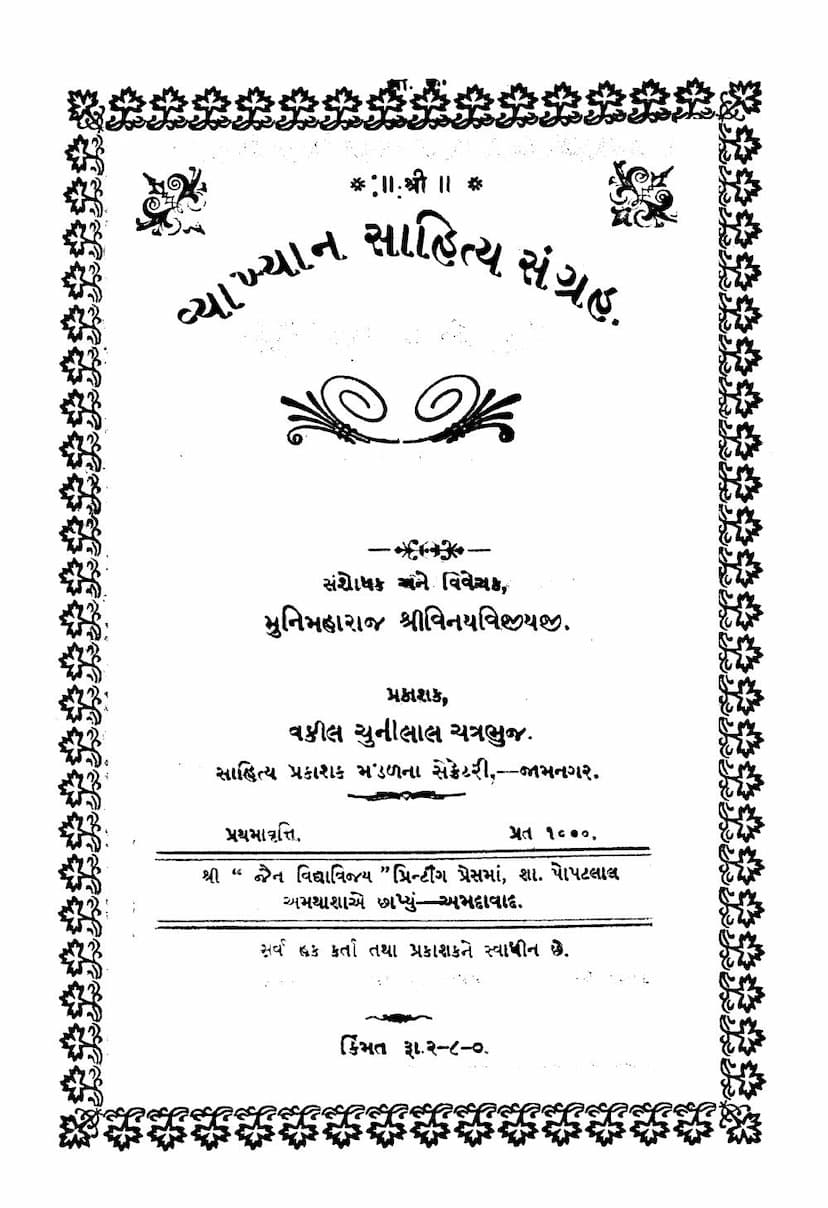Vyakhyan Sahitya Sangraha Part 03
Added to library: September 2, 2025

Summary
The provided text is the third volume of the "Vyakhyan Sahitya Sangra ha" series, authored by Vinayvijay. This volume, published by Devji Damji Seth, is the first edition with a print run of 1900 copies, printed at Shri Jain Vidyavijay Printing Press in Ahmedabad.
The book is a collection of discourses (Vyakhyan) and covers a wide range of topics, presented in a systematic manner with an index (Anukramanika) and an alphabetical index of Sanskrit verses. The author, Muni Shri Vinayvijayji, is described as a researcher and critic.
The content is structured into twelve chapters (Parichhed), each focusing on a specific aspect of Jain philosophy, ethics, and practices. The text emphasizes the importance of:
- Right Conduct (Vyakhyan): The initial chapters likely set the stage for understanding Jain principles through discourses.
- Morality and Ethics: Discussions on the importance of good conduct, adherence to vows, and the philosophical underpinnings of Jainism are evident.
- Self-Discipline and Renunciation (Tyaga and Viraga): Several chapters delve into the concepts of detachment from worldly pleasures and the pursuit of spiritual liberation.
- Knowledge and Wisdom (Gyan and Vivek): The text highlights the acquisition of right knowledge and the application of wisdom in daily life and spiritual practice.
- The Nature of the Soul and Liberation (Moksha): The ultimate goal of Jainism, liberation of the soul, and the path to achieve it are explored.
- The importance of rituals and practices: The book likely explains the significance of various Jain rituals, prayers, and practices.
- Social and Practical aspects: The text also seems to touch upon practical aspects of life, such as the importance of a healthy lifestyle and societal interactions, seen in chapters like "Arogya Adhikar" (Health Rights) and "Buddhi Adhikar" (Intellect Rights).
- The role of reason and intellect: The importance of understanding the principles of Jainism through reasoning and critical thinking is also a recurring theme.
- The power of human will and conviction: The text likely showcases how strong willpower and conviction can lead to spiritual progress and overcome obstacles.
- Moral and Ethical Teachings: The book seems to provide guidance on living a virtuous life, emphasizing principles like non-violence (Ahimsa), truthfulness (Satya), non-possession (Aparigraha), and non-attachment (Vairagya).
- The teachings of Tirthankaras: The discourses might also explain the profound teachings of the Tirthankaras, the spiritual guides in Jainism.
The book also contains excerpts from other renowned works and includes poetic compositions and anecdotes to illustrate the points. It seems to be a comprehensive work aimed at educating and guiding Jain followers on their spiritual journey, emphasizing the practical application of Jain principles in daily life for achieving both worldly well-being and ultimate salvation.